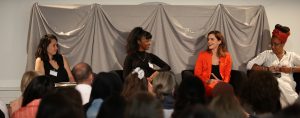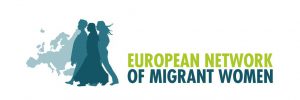
Left to Right: Devi Leiper O’Malley (FRIDA–The Young Feminist Fund); Nasra Ayub (Integrate UK); Emma Watson; Marai Larasi (Imkaan) // Photo Credit: Fiksa
From Violence to a Place of Power: A Funder Convening on Movement Building to End Sexual Violence
20 July 2018—The movement to end violence against girls and women is gaining global momentum due to the dynamic and courageous work of grassroots activists, yet their work faces growing threats and needs more support and solidarity from across philanthropy, a day-long convening of activists, funders, journalists and culture shapers said in London on 10 July 2018.
From Violence to a Place of Power: A Funder Convening on Movement Building to End Sexual Violence was convened by NoVo Foundation, Oak Foundation, Unbound Philanthropy and Ariadne, and facilitated by Jude Kelly, to explore how philanthropy can radically increase its support for the movement to end violence against all girls and women.
Deepening a conversation that began at a similar convening of U.S. funders in New York in April, the London convening sought to examine the specific context for work to end sexual violence in the UK and Europe, where growing momentum around #MeToo and other movements is coupled with rising nationalism, austerity politics, the closing of civil society space and assaults on human rights.
Actor and activist Emma Watson chaired the opening session of the day—an intergenerational conversation among activists Nasra Ayub (Integrate UK), Marai Larasi (Imkaan), and Devi Leiper O’Malley (FRIDA–The Young Feminist Fund). The panelists outlined the pivotal role of movement building and feminist organizing in ending violence against girls and women, as well as the urgent need for many more funders and donors from across the philanthropic sector to trust movement leaders and provide long-term, flexible support to sustain their work.
Responding to research across seventy countries that concluded that women’s movements were the key factor in determining policy change, Emma Watson said, “This makes it all the more shocking that a survey of European foundations found that less than 5 percent of funds were targeted towards girls and women. I think supporting girls and women’s organisations is the greatest hope we have for worldwide transformative change – and my philanthropic choices are grounded in that belief.”
She currently supports more than thirty organisations in the equality and women’s rights movements in the UK and globally, and has donated $5 million USD to these causes over the past 12 months alone. £1 million GBP of this was to the Justice and Equality Fund, which was catalyzed by the UK TIME’S UP movement and is hosted by Rosa, the UK’s leading women’s fund.
“Long-term partnerships, rather than funding against short-term results, are absolutely critical,” she added. “Without flexible, core funding, activists don’t have the room and space they need to be innovative and create long-term change.”
All of the panelists described how the current breakthrough in public attention to sexual violence is grounded in decades of work by movement leaders, many of whom are women of color, whose often unrecognized efforts have made this moment possible.
“It’s essential that we engage with MeToo not as something new, but recognize that organizing and resistance have always been a fundamental part of the long herstory of women’s activism,” said Marai Larasi. “We must locate this moment within the generations of work that have come before.”
The intergenerational discussion also highlighted the critical importance of elevating girls’ voices and girl-led organizations as a central part of any response to gender-based violence, and to creating space for new ideas and energy.
“Young feminist organizing is about holding a line that’s been courageously made by so many others before them, and then advancing that shared agenda in today’s context,” said Devi Leiper O’Malley. “Young women, girls, and trans*youth have the curiosity, anger, openness and drive to create lasting change. Their activism might look different from what has been done before, but it deserves flexible, long-term support and trust from across philanthropy.”
Austerity and Violence against Girls and Women
A second panel, ‘They Cut We Bleed’: #MeToo in Austerity Britain, examined the effects of austerity politics in the UK, the resulting cuts in investments in basic and social services, and their deep implications for survivors of violence against girls and women. In one year alone, between 2010/11 and 2011/12, there was a 31 percent cut in funding to the sexual violence and domestic violence sector in the UK, with a deep and disproportionate impact on women of color.
Chaired by the journalist Bidisha, the panel included Pragna Patel, Southall Black Sisters, Monica Aidoo, Women for Refugee Women, a student from Mulberry School for Girls, and Nathalie McDermott, On Road Media.
“It’s so important for us to remember that sexual abuse was around long before #MeToo. It has offered an unprecedented global spotlight on the issues, yet there’s a huge gap between massive public interest and real resources for survivors — all of which is heightened by austerity politics,” said Bidisha.
“We are part of a political struggle, we are not just service providers,” said Pragna Patel. “True success will only come when you combine frontline services with politics. We must meet women’s everyday needs, but long term change comes from challenging the root causes of oppression.”
Rising Authoritarianism
Expanding the scope even further, a third panel of activists examined the work of ending violence against girls and women amid a backdrop of growing authoritarianism across Europe. Panelists included Gergana Kutseva, The Bulgarian Fund for Women,Krystyna Kacpura, Federation for Women and Family Planning, Poland, Denise Charlton, Repeal the 8th Campaign, Republic of Ireland, Anna Zobnina, European Network of Migrant Women.
“We are witnessing growing and strong opposition to women’s rights across Europe — and to civil society as a whole,” said Gergana Kutseva.
The panelists described how rising tides of nationalism, xenophobia and right-wing populism show up in the specific country contexts in which they work and made the direct connection between the policing of women’s bodies and the policing of borders. The result is a push back against hard won policies like the Istanbul Convention that enshrine the right to a life free from violence.
“We work across generations and borders, because we know male violence and oppression is universal,” said Anna Zobnina. “Our work is about building solidarity across cultures, countries, religion, and non-religion. We do it because as migrant women we understand the meaning of rupture, disconnect and loss.”
Deepening philanthropic support
While violence against girls and women is a worldwide pandemic affecting 1 in 3 women in their lifetimes, funding in the philanthropic sector for work to end gender-based violence has remained extremely low. (A survey by Ariadne found that the number of foundations that support work to end violence against women in Europe is small, and that funding tends to be at a low level and short-term compared to expressed needs. A Ms. Foundation study among U.S. Foundations found that support to end gender-based violence totaled just 1.8 percent of all foundation giving.)
The afternoon sessions were designed as a space for funders to share learning, strategize, build relationships, and chart a future where the movement to end violence against girls and women gets the full support it deserves.
“With survivors leading the way, we’re witnessing an unprecedented mass mobilization against sexual violence. Now it is time for philanthropy to match the courage, urgency and commitment of the movement leaders who got us here,” said Pamela Shifman, executive director of the NoVo Foundation. “Ending violence against girls and women is fundamental to every philanthropic mission, and there is a huge opportunity for many more funders to join in supporting this innovative and important work.”
NOTE: Additional video clips and photos will be posted in the coming days to https://www.metooandphilanthropy.org/2018-london/
###
CONTACT:
Joe Voeller
NoVo Foundation
+1 (347) 743-6403
